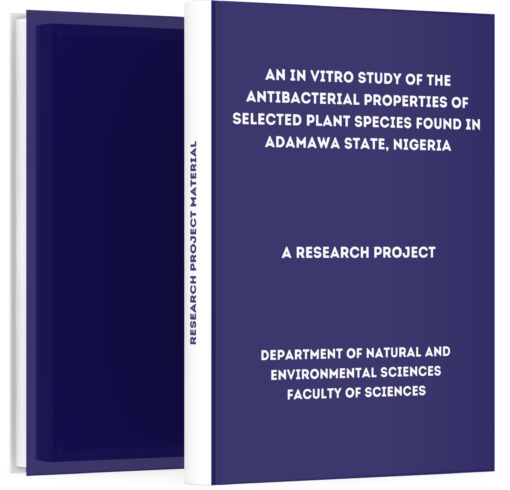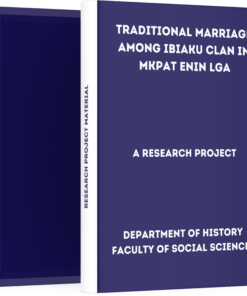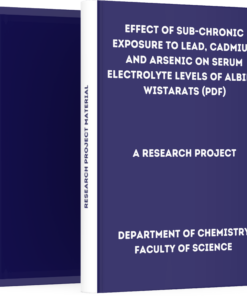An in Vitro Study of the Antibacterial Properties of Selected Plant Species Found in Adamawa State, Nigeria
₦3,000.00
If you are interested in getting this project material “An in Vitro Study of the Antibacterial Properties of Selected Plant Species Found in Adamawa State, Nigeria”, click on the DOWNLOAD BUTTON to make payment and the file will be delivered to your email immediately after confirmation.
Description
Download An in Vitro Study of the Antibacterial Properties of Selected Plant Species Found in Adamawa State, Nigeria. Natural And Environmental Sciences students who are writing their projects can get this material to aid their research work.
Abstract
The antibacterial activity of plant extracts compared to a known antibiotic (ampicillin) was evaluated against ten gram-negative and gram-positive bacteria which can infect humans.
In addition, the efficacies of different extraction methods were studied. Soxhlet, cold aqueous, and hot aqueous extractions were used in this study.
Moreover, extracts from the following plants were utilized: Zingiber officinale (ginger); and the leaves of Agave americana (agave), Musa acuminata (banana), Mangifera indica (mango), Azadirachta indica (neem), and Eucalyptus sp. (Eucalyptus).
The most antibacterial activities were observed for the extracts of Eucalyptus sp. and Mangifera indica, which inhibited 60% and 50% of the tested bacterial species, respectively.
There was significant activity against gram-positive bacteria. Agave and banana extracts, on the other hand, did not demonstrate any antibacterial activity.
Introduction
There has been a rise in antibiotic resistant bacteria over the last decade. This is mainly due to the mainstream misuse of them.What’s more is that these strains of bacteria are found where the most vulnerable people in communities are, hospitals (Wilson, et al. 2011).
The combination of weak host defenses and drug-resistant bacteria has led scientists to explore new options in antimicrobial therapy.One of these options is the plant kingdom. For millennia, plants have been used and marketed in one way or the other for a perceived ability to cure diseases.
In fact, 60,000 years ago, a plant called hollyhock was used for medicine by Neanderthals living in present-day Iraq (Cowan 1999).
How to Download this Project Material
First, note that we are one of the best and most reliable online platforms because we don’t retain any of your personal information or data as regards making payments online.
PRICE: ₦3,500 ₦3,000 (Three Thousand Naira Only)
Make a bank deposit or mobile transfer of ₦2,000 only to the account given below;
Bank Name: UBA Account Number: 1022564031 Account Name: TMLT PRO SERVICES
After making the payment, CLICK HERE to send the following on WhatsApp;
- Depositor’s Name or Screenshot of Payment
- Name of the Past Question
- Active Email Address
or Call Us On +2348082284439 Once your details have been received and your payment confirmed by us, you will receive the past question in your email or WhatsApp within 5 Minutes.
Guarantee of Getting the Material
We understand that due to the high rate of fraud, many people are afraid of making purchases online but be rest assured that PastExamQuestions will deliver your material after payment.
Once your details have been received and your payment confirmed by us, you will receive the past question in your email or WhatsApp.
Give us Feedback
Have we been able to satisfy you? How well do you think the material will be helpful after having gone through it? Does the price worth the material?
Let’s hear from you! We recommend that our customers give feedback at the end of every transaction to enable us to serve better. You can do this by clicking the review button on this page.
Where is the review button? >> Just scroll up to where you see reviews





Reviews
There are no reviews yet.